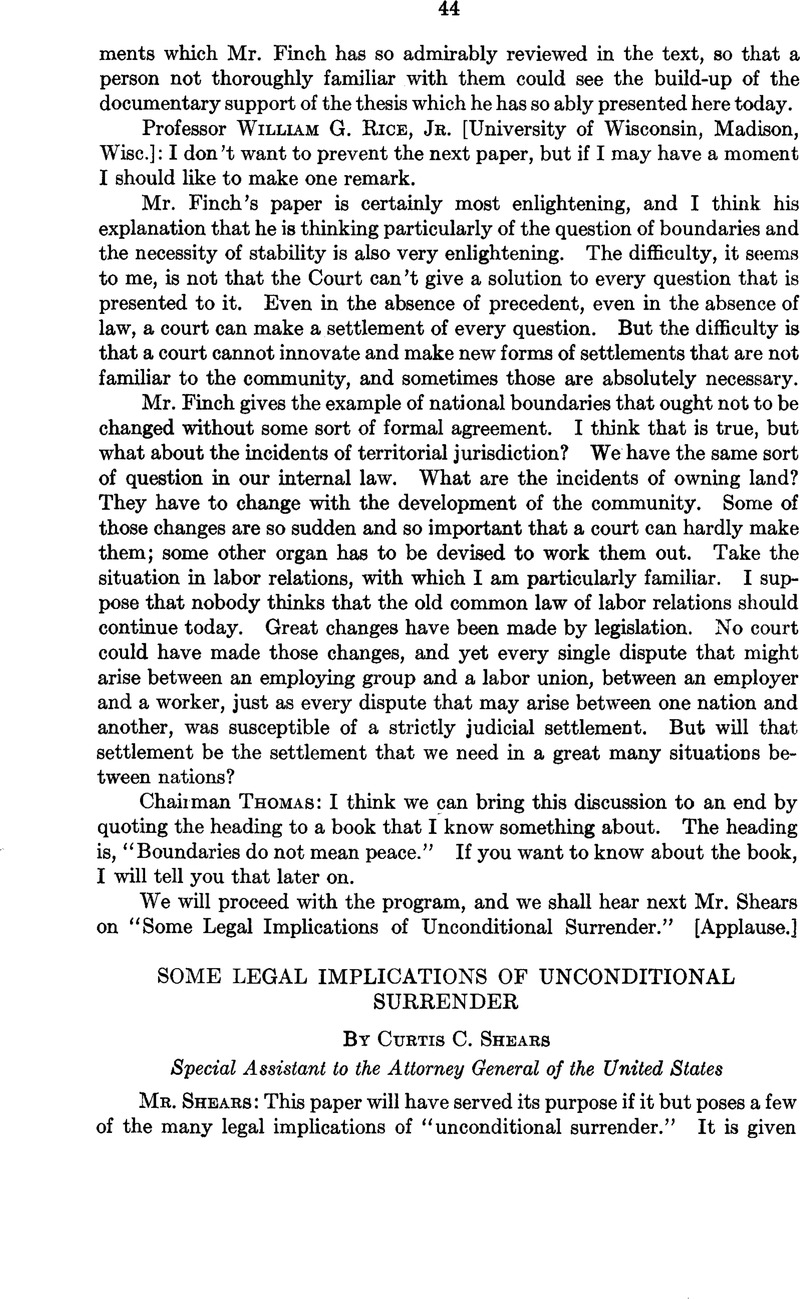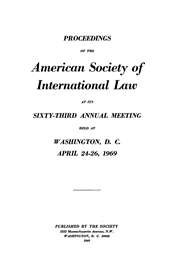No CrossRef data available.
Article contents
Some Legal Implications of Unconditional Surrender
Published online by Cambridge University Press: 27 February 2017
Abstract

- Type
- Second Session
- Information
- Copyright
- Copyright © American Society of International Law 1945
References
1 All assumptions of a political nature used as a basis for this paper are taken from published reports in the press and on the radio and do not represent any unpublished, secret, or confidential views of any department of the United States Government.
2 The rights and obligations of belligerent occupation are set out in Articles 42 to 56 of the Hague Regulations concerning the conduct of war on land.
3 As the traditional international law of belligerent occupation is supplemented by the municipal systems of various countries, a convincing argument could be made that these conventions have not kept pace with the changing relationships of private property rights under total war. As some of the present belligerents have not ratified one or the other of these conventions, they might be regarded as not in force in this war. However, in deference to customary international law the United States has formally announced that the provisions of the Hague Convention of 1907 will be observed and enforced by the Army of the United States as provided in Rules of Land Warfare PM 27-10 (Section 1, War Department Circular No. 136, 7 May 1942).
4 In effect the doctrine of postliminium amounts to a truistic statement that property and sovereignty cannot be regarded as appropriated until their appropriation has been completed in conformity with the rules of international law: Hall, International Law, 7th Ed., § 162, p. 517. In the absence of an agreement to the contrary, the conquered territory reverts at the end of the war to the legitimate sovereign or its successor as though the sovereignty had not been interrupted, so far as international law is concerned. However, the government to which possession of such territory finally reverts must recognize those legitimate acta that the military occupants have the authority to exercise by international law. The doctrine of postliminium does not attach after an interregnum: C. C. Hyde, International Law, Vol. II, § 992, p. 857; L. Oppenheim, International Law, 6th Ed., Vol. II (1940), § 282,p. 483.
5 The reestablishment of an independent, democratic Austria could result from an action initiated by the Austrian people just as a division of Germany could be initiated by the German people and supported by the occupying powers provided it was done in a peaceful manner within the Hague Regulations. However, the provision of Article 43 requiring respect for the laws in force in the country would not apply to discriminatory laws of the Nazi Government.
6 The Roman debellalio. The concept that war is to be waged against Germany and Japan until there is an unconditional surrender of each of these two Powers has received official acceptance by the Allied Governments. Unconditional surrender may be brought about by a unilateral offer made by a defeated nation to abandon a hopeless struggle which would only involve useless loss of life on the part of a hopelessly beset force. It differs from a capitulation or an armistice mainly in that there are no conditions or limitations binding upon the victor. Prime Minister Churchill stated in Commons on April 12, 1945, that “ The policy of unconditional surrender does not exclude unconditional surrender piecemeal, and is not necessarily applied only to wholesale surrender.”
7 Although Germany is referred to exclusively in this paper, the same reasoning would apply to any of the Axis Powers.
8 Oppenheim, 6th Ed., Vol. II (1940), § 266, p. 469.
9 Capitulations are military conventions between armed forces of belligerents stipulating and agreeing to specified terms of military surrender only. If they contain arrangements other than those of a military character, they must be ratified by the political authority of both belligerents. Capitulations like armistices bind the signatories to the scrupulous observance of the terms and conditions of the written document (Article 35, Hague Regulations), and the surrendering forces become prisoners of war. These bilateral agreements also run the risk of being whittled away by claims of duress and coercion. L. Oppenheim, International Law, 6th Ed., Vol. II (1940), § 235, pp. 430-7.
10 Keynes, J. M., The Economic Consequences of the Peace 1920, p. 150.Google Scholar
11 The Hague Regulations provide in effect that a change in the status quo from the date of the commencement of the armistice until the peace treaty constitutes an international delinquency.
12 Where an agreement is silent or in the absence of an agreement, international law fills the gap: Hyde, C. C., Internationl Law, 1945 (2d ed.), Vol. III , § 905, p. 2386 Google Scholar; Despagnet, , Cours de droit international public, 1919 (4th ed.), p. 941 Google Scholar; Diena, , Diritto internazionale, 1930 (3d ed.), Vol. I, p. 745 Google Scholar; Bustamante, , Derecho international public, 1937, Vol. IV, §1152, p 515;Google Scholar Listz, , Das Vdlkerrecht, 1925, p. 556;Google Scholar Oppenheim, pp. 467-471; Strupp, , Elements du droit international public, 1930, pp. 524-526.Google Scholar
13 Kelsen, Hans in American Journal of International Law, Vol. 38 (1944), p. 691;CrossRefGoogle Scholar Feilchenfeld, E. H., The International Economic Law of Belligerent Occupation, 1942, § 28, p. 8.Google Scholar
14 General Eisenhower's letter to the President, dated March 31,1945 and recently published, indicates that as long as the Nazi Government retains a semblance of political power an effort will be made to continue resistance throughout all areas under Nazi control.
15 Oppenheim, L., International Law, 4th Ed., Vol. II, § 60, p. 126;Google Scholar Hyde, C. C., International Law, 1945, Vol. III , § 652.Google Scholar
16 The evidence of intention of the Moscow Declaration to divide Germany into two or three States would, in any case, exclude such continuity.
17 Hyde, C. C., International Law, Vol. III, § 907 and 922 (2d Ed., 1945);Google Scholar Oppenheim, L., International Law, 6th Ed. (1940), Vol. II, p. 467.Google Scholar
18 Oppenheim, L., International Law, 6th Ed. (1940), Vol. II, pp. 467 and 484;Google Scholar Hyde, C. C., International Law (2d Ed. 1945), Vol. III, § 907, p. 2390.Google Scholar
19 Other examples which appeared to be interregnums pending settlement are the condominium of Austria and Prussia over Schleswig-Holstein and Lauenburg from 1864 to 1866; the condominium of Great Britain and Egypt over the Sudan since 1898; the condominium of Great Britain and France over the New Hebrides since 1914; the condominium of Austria and Hungary over Bosnia and Hercegovina from 1909 to 1918.
20 Disapproval in the United States and elsewhere of the endeavors of a belligerent occupant to resort to subjugation has been directed against this mode of effecting a change of sovereignty rather than against this mode of terminating a war.
21 ” Most of the restrictive provisions of the Hague Regulations do not apply to this means of terminating a war. Thus the armed forces of Germany may be demilitarized and utilized in the rehabilitation of surrounding countries and war criminals prosecuted without a treaty with the Nazi Government.
22 If there is no recognized German Government at the time peace is announced sovereignty passes on the principle of uti possidetis: C. C. Hyde, Vol. Il l, §§ 921, 907.
23 The new constitutional life could take its historical and psychological continuity from the Weimar Republic before the Nazis interrupted this continuity by unconstitutional acts: Hans Kelsen, “ The International Legal Status of Germany to be Established Immediately upon Termination of the War,” in The American Journal of International Law, Vol. 38(1944), p. 689. Also see Lemkin, R., Axis Ride in Occupied Europe, 1944, Chap. III , pp. 25-31.Google Scholar
24 The joint resolution of May 15, 1920, brought to an end the war between the United States and Germany. Cf. Chinese Parliament's Act of September 3, 1919. Hyde, Vol. II, § 905, p. 822; Pinch, George A. in American Journal of International Law, Vol. XIV (1920), p. 155.Google Scholar
25 In general there is a need for agreement between the Allies on definitions, methods of procedure, and effects of every act of its representatives.
26 A state of siege was declared in Germany on February 28, 1933, and has never been lifted.
27 Any document which could be interpreted as an armistice might in the absence of language in the document indicating an agreement to the contrary invoke the provisions of the Hague Regulations requiring all the German military forces to be treated as prisoners of war until a treaty of peace is signed as well as serving as a limitation on the military government in issuing any orders, ordinances, proclamations, and instructions which it may deem desirable for the peace and long range security of the world. There is a disputed school of thought which contends that once an armistice is signed the agreement speaks for itself and excludes the Hague Regulations. There is no dispute, however, that a unilateral document of unconditional surrender gives all the authority needed by the Allied Governments to take whatever steps thereafter they may deem necessary within the concepts formerly applied to a debellatio or subjugation in International Law. Hyde, Vol. III , § 907, p. 2389.
28 Lauterpacht, H. in The Function of the Law in the International Community (1933),§ 16, p. 91,Google Scholar and Feilchenfeld, E. H. in The International Economic Law of Belligerent Occupation.Google Scholar
29 “ If the war is sought to be terminated by any process falling short of agreement, utmost care is required in order to prevent the resumption of peace from operating advantageously,in an international sense to the conquered State. C. C. Hyde, International Law,Vol. I l l , § 905, p. 2387 (Second Revised Edition, Boston 1945).
30 The International Law of the Future, 1944, pp. 290-313.




